Trail Running Tips for Beginners
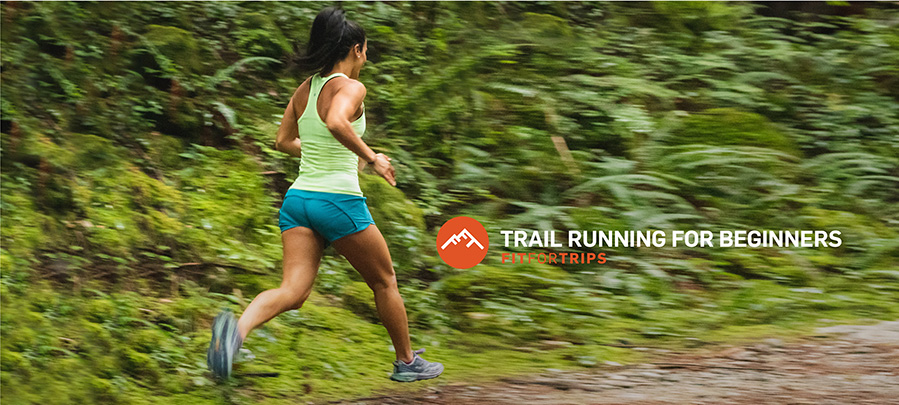
This is the first post in our trail running series. Check out our 2nd one Start Trail Running Today with Zero Miles of Experience. One does not replace the other; read both.
Fit For Trips believes that trail running is a good addition to any hiking workout, which is why we consulted with some of our favorite Atlanta athletes to get some beginner trail running tips.
Note: Beginners might only be able to run the flats. Then, with more experience and after getting in better shape, your ability to run uphill will come much more naturally. Running downhill is a combination of strength, balance, stability, and surefootedness, which might take the longest to develop in some cases.
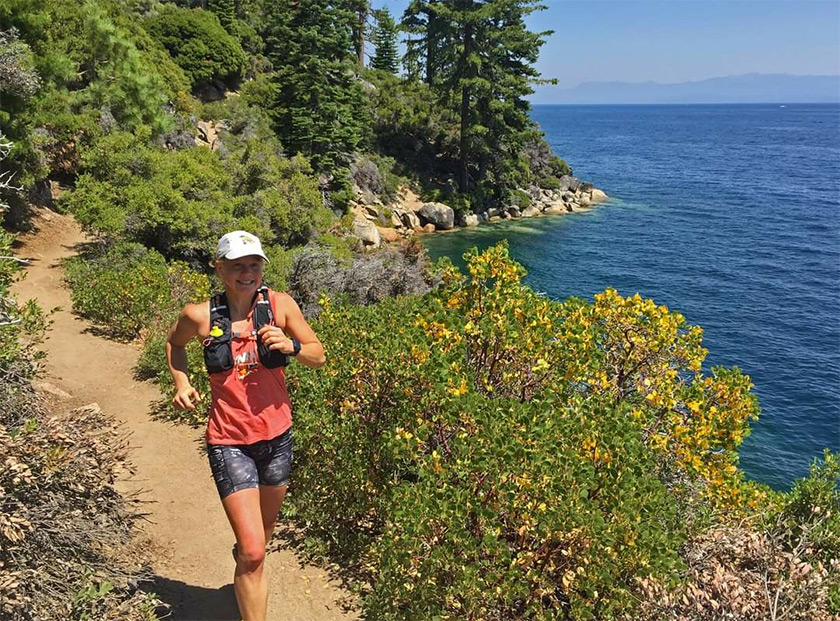 Kate B trail running on the Lake Tahoe Flume Trail – pic by Rogue Expeditions
Kate B trail running on the Lake Tahoe Flume Trail – pic by Rogue Expeditions
How are trail running shoes different?
Trail running shoes have three main differences from regular athletic shoes:
- Outsole – Deeper lugs for better traction on uneven terrain and wet, muddy conditions.
- Midsole – Stiffer and firmer and sometimes have a rock plate to protect you from jagged rocks or roots. They are also sturdier and durable.
- Upper – A toe guard to protect you from kicking rocks. They also have a tightly woven fabric to keep debris out and make the shoes durable.
Can you run on the road with these shoes?
Yes, but is not suggested. Trail shoes are much firmer and heavier than road shoes, which does not feel great on the harder roads. It will also wear down the lugs faster.
Do I need trail shoes for trail running, and if yes, why?
It highly depends on the kind of trail. If it is well groomed and untechnical, you could be okay with a road shoe. If it is more technical and/or in bad condition, trail shoes are greatly beneficial. They provide more protection and stability, and therefore more confidence on the trail.
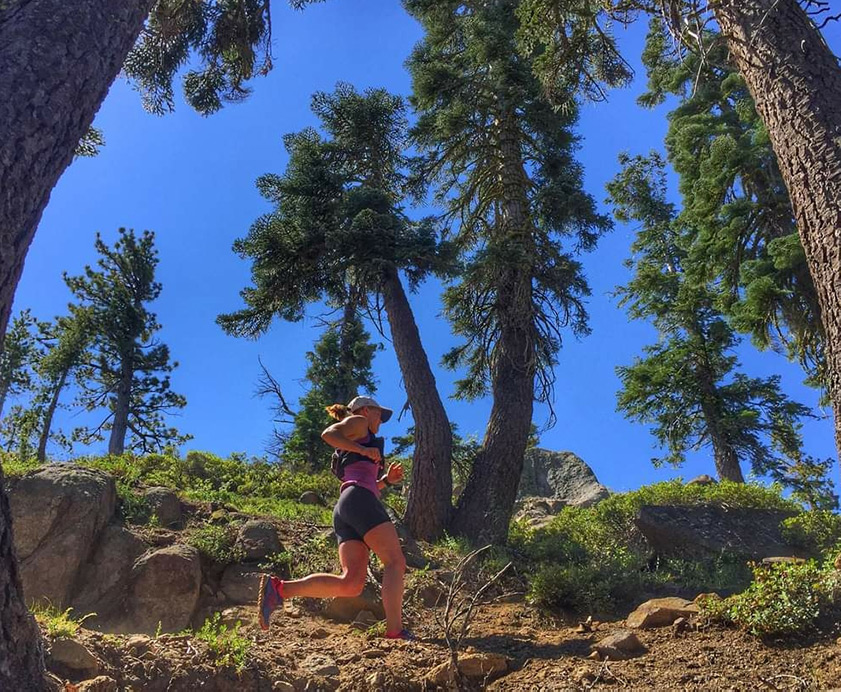 Kate B trail running on the Pacific Crest Trail during her Run Tahoe trip – pic by Rogue Expeditions
Kate B trail running on the Pacific Crest Trail during her Run Tahoe trip – pic by Rogue Expeditions
Can you wear trail shoes on treadmill?
It is not suggested. They are too firm to be comfortable and the aggressive lugs may cause harm to the treadmill.
Trail running vs road running: Which is better?
In my opinion, trail running is much, much better! I love slowing down, escaping into nature, and I feel that the softer surface and varying terrain is easier on my body. However, both have a purpose and their own benefits.
Is trail running harder than road running?
Not necessarily. It depends greatly on the route. Many times, trails are more technical and provide more obstacles, which means you will need to slow down and focus more. Road running, on the other hand, allows you to run at a faster pace. The surface is much harder and smoother. However, beginner trail runners require an acclimating phase due to the stress that running imposes on feet, ankles and knees. That knowledge suggests starting on soft dirt trails as opposed to firmer roads is a smart idea.
 Kate B trail running in the Mystery Mountain Marathon at Fort Mountain State Park – pic by GUTS (Georgia Ultra and Trail Society)
Kate B trail running in the Mystery Mountain Marathon at Fort Mountain State Park – pic by GUTS (Georgia Ultra and Trail Society)
What are the best trail running shoe brands and models?
There are lots of great options. It all depends on your foot (arch, width, etc.) and the type of trails that you are running on.
- Hoka, Women’s Salomon & Men’s Salomon, Men’s Altra & Women’s Altra, Columbia Montrail, Men’s LA Sportiva & Women’s LA Sportiva– considered more “trail brands,” with aggressive lugs. Also great for hiking trails in place of traditional hiking shoes.
- Brooks, Nike, Asics, Women’s Saucony & Men’s Saucony, New Balance – considered good “hybrid” options, not as aggressive, good on less technical trails, and can work better on roads.
What shoe brand and model do you personally use for trail running?
- Hoka Speedgoat 4 – It fits my foot perfectly and is the most comfortable trail shoe I have tried. It has a wider base which keeps it more stable. Great traction and grip to help on wet mud and slick rocks. The maximum amount of cushion makes me feel like I could run forever in them.
- Hoka Torrent – I like the wider footbed. It has a good grip and is considered a lighter, more agile trail option.
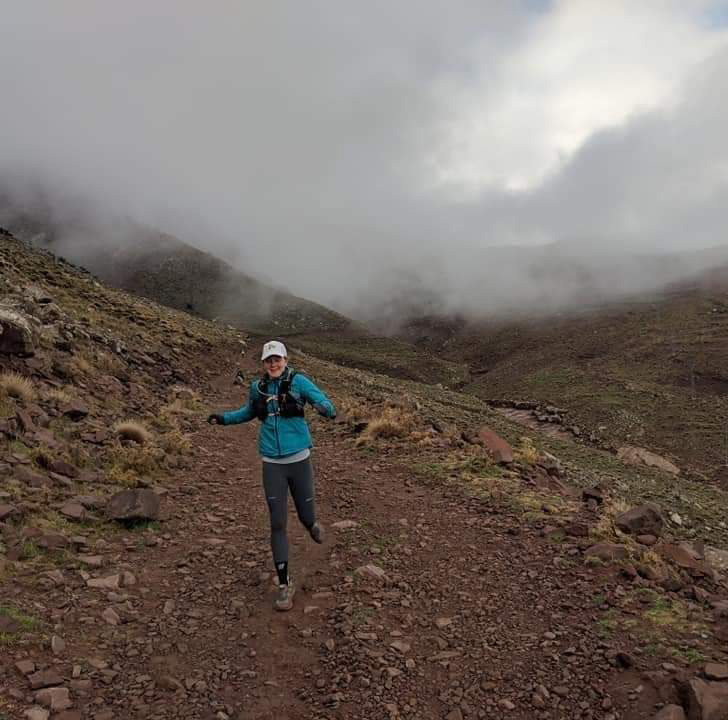 Kate B trail running in the High Atlas Mountains of Morocco – pic by Rogue Expeditions
Kate B trail running in the High Atlas Mountains of Morocco – pic by Rogue Expeditions
When do you trail run vs. road run?
- I prefer to trail run as much as possible, especially on longer runs. With the softer surface and varied terrain, I feel like it’s easier on my body and I really enjoy getting in the woods to escape the hustle and bustle. I get to slow down but also get a good, challenging workout.
- I run trails when I have extra time for the commute, slower miles, and the higher probability of getting lost.
- I usually road run during the week and trail run on the weekends when I have more time to travel and run longer.
- I often suggest that trail or road running beginners find flat and smooth dirt surfaces to initiate their training.
What other trail running tips do you have to help beginners prepare?
- Get comfortable trail shoes, a hydration pack or handheld, hydration drink or fuel of choice, and a map or trail app on phone. Start slow and gradually increase your time and miles on the trails. Build quad and core strength. Also, learn to power hike up hills!
- Walk before you run! Don’t be afraid to slow down and walk when needed.
- Make sure the night before to pack plenty of water and nutrition, anti-chafe cream, bandages in case of falls, and plan a route in mind. Depending on the weather, you may want to wear a hat, rain jacket, or compression socks. You should start slowly on the trail so that you are not tripping early and try to pay attention at least 3 feet in front.
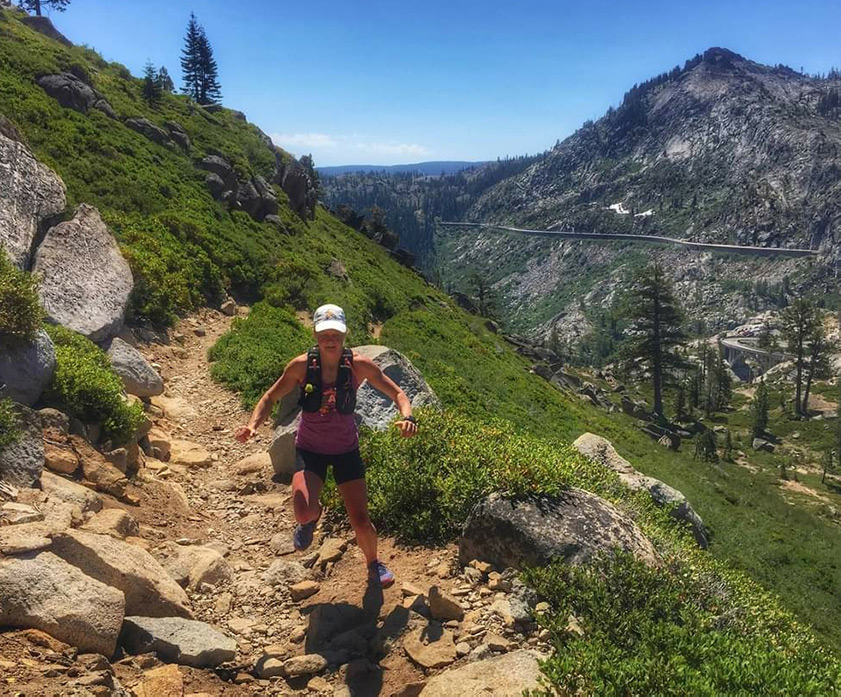 Kate B trail running on the Pacific Crest Trail during her Run Tahoe trip – pic by Rogue Expeditions
Kate B trail running on the Pacific Crest Trail during her Run Tahoe trip – pic by Rogue Expeditions
What tips do you have to help build stamina?
- Run trails often and try to incorporate hills as much as possible. Build gradually as your muscles get stronger and you get better conditioned.
- Beginners can start with hiking and add more running over time. Incorporate other exercises and intervals to build strength.
- Do a lot of strength training and make sure you are eating enough during the run.
Should you use your trail running shoes for hiking?
- Absolutely! Trails shoes share many of the same important characteristics as hiking boots, including a rock plate, toe guard, and aggressive lugs. Trail running shoes are more comfortable, lighter, softer, and allow more agility than hiking boots. Ultimately, you need to use what you are most comfortable in and keep your feet happy for a long period of time.
Would you consider trail running as a way to train for a challenging hiking trip?
- Yes, trail running will help build stamina and strength.
- Yes! It will help you build endurance without added weight of a heavy pack and will get you more comfortable on the trails.
- Yes, the ability to be on your feet for a long period of time definitely helps.
 Kate B trail running on Deep Creek Trail near Bryson City, TN
Kate B trail running on Deep Creek Trail near Bryson City, TN
Note: If you are not currently a runner and you want to start trail running, then these beginner trail running tips are a great place to start incorporating into your trail running plan. However, you should note that if you currently have any medical issues with your toes up to your low back, you should consult with your physician or physical therapist before running the trails.
Ready to start getting in shape and put these trail running tips to good use? Contact us today to set up your complimentary fitness consultation.

Young Flakz
This is really great article. I have got every single point in this article. Thanks for sharing it.